Amandla Ooko-Ombaka: Ask for forgiveness, not for permission
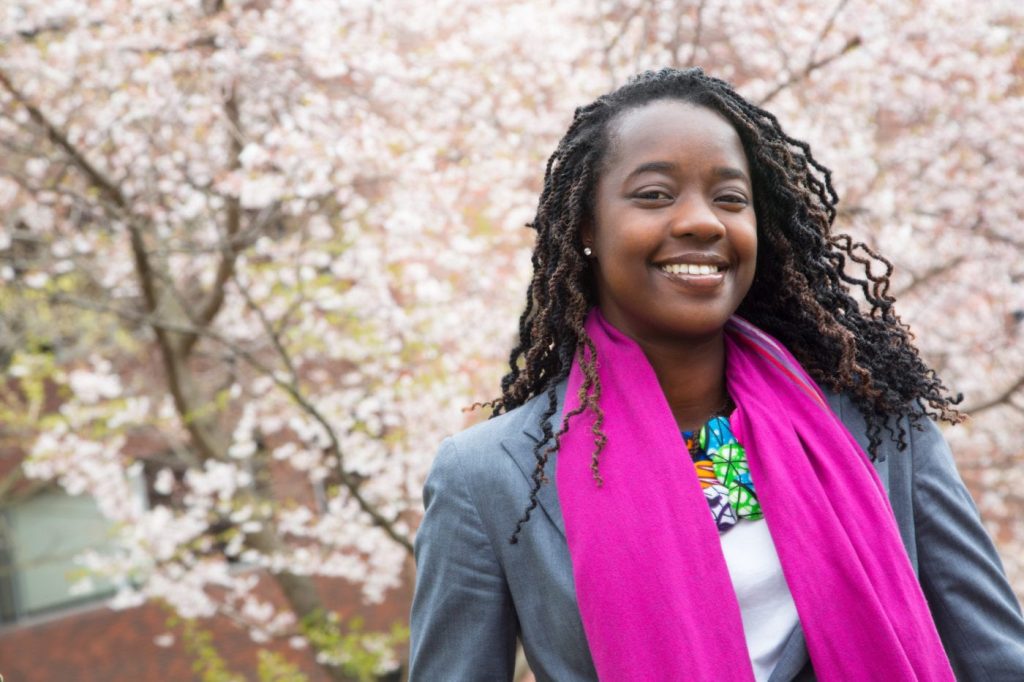
[bctt tweet=”We need people who can walk between the worlds of business and government @AmandlaOO” username=”SheLeadsAfrica”] When you’ve graduated from not one but two Ivy league schools it’s safe to say you are one highly educated individual. Amandla Ooko-Ombaka is not only book smart but has built her professional career with years of experience as a Management Consultant at McKinsey & Company, the world’s biggest consultancy firm. You’d think that would be it for her but not at all. Amandla’s ambition has her advising various non-profit boards as well as co-founding initiatives such as Second Story Africa and the Yale Leadership Institute. We can’t resist adding that she’s currently writing a biography of her late father, top Kenyan lawyer and politician, Oki Ooko-Ombaka. Our SLA contributor managed to secure a few minutes of her time to see if she does ever Our SLA contributor, Diana Odero managed to secure a few minutes of Amandla’s time to see if she does ever catches a break and to find out what motivates her. How does one juggle the various hats you wear and do it so well? I think the notion of daily balance is false so I don’t try and achieve balance on a day to day basis. It’s impossible with the job I do, where sometimes I work 17hr days, to say that I will go to the gym today, I will cook today, I will see my friends today…it’s just not possible. So I think the first step was allowing myself to think about balance over a period of time and that also gives me time to evaluate. Every two months I try to live a balanced life. Meaning in those two months, there’s good periods of working out, of sleep, of seeing my family and of work. [bctt tweet=”The notion of daily balance is false so @AmandlaOO doesn’t try to achieve it on a daily basis” username=”SheLeadsAfrica”] The second step was learning how to say no, which I think has been a much harder lesson for me to learn. I find it very hard to say no especially to people I care about. So, I sort of tell the person asking me to do this or the other; that this is a really cool opportunity and I’m grateful but have to say no in the hope that this opportunity will be there again in future. Once I remove this notion that I’m not the only one who can do this thing, it makes it easier to say no. On top of your quite extensive and busy schedule, you are also writing a book. Tell us more about it and why you felt a need to do this now. The book is a biography of my father. It has been a passion project for the past 10 years. My siblings and I had constantly talked about doing it. I finally took some time off between graduating last year and going back to work to put some real time into the book. The process revealed itself in many different ways one being the more we work on this, the more it becomes our own story. We’re discovering who our father was and the contributions he gave to this country and to this world. I realize we are in a very unique position as his children to write about our perspective of him. We are trying to juggle telling his story and telling ours because his story has so much merit to stand on its own but our story is also valid and legitimate. The timing of this could not be more perfect as I finally moved home after living abroad for a while and I would love to get engaged in politics at some point. In many ways, my political identity is very much tied to my father’s political identity. So I need to understand him, who he was in his early years of politics and what formulated his opinions in order for me to make my own opinions. [bctt tweet=”Amandla Ooko-Ombaka’s political identity is very much tied to her father’s legacy” username=”SheLeadsAfrica”] You recently completed a dual Masters degree at Harvard, something not many achieve – what motivated you to pursue the two courses – an MBA and MPA/ID (International Development), simultaneously? I chose the dual degree because it was a reflection of who I am as a person. Some people may think it’s a lack of focus but my heart is very much in the public sector and my mind is very much in the private sector and I’ve just stopped fighting that. I’ve embraced who I am and my heart and my mind need different avenues to be fulfilled and to work optimally. Harvard business school catered to my mind and the public sector school while Kennedy catered to my heart. [bctt tweet=”My heart is in the public sector & my mind is in the private sector – Amandla Ooko-Ombaka” username=”SheLeadsAfrica”] At a more fundamental level, I think that we need more multidisciplinary thinkers in the world we live in. Things are exceedingly complex and we need the sectors to work together. I don’t think business and government should be the same thing but we need people who can walk between the two worlds. Harvard doesn’t want you to be half a business person and half a public sector person. You should be able to completely hold your own in the two separate schools which I think is really important. I’m multidisciplinary by nature and I think there’s a role for people who think like me. A lot of the things I care about like power and utilities will not be funded by the government. The private sector will fund a lot of these projects, but they need the government to eventually take over asset ownership, right of passage etc. These two disciplines need each other so much more than we like to talk about. It is my life’s mission to bring them closer together. The joint
Vivian Sonny-Nsirim: I have a passion to inspire and motivate young mothers
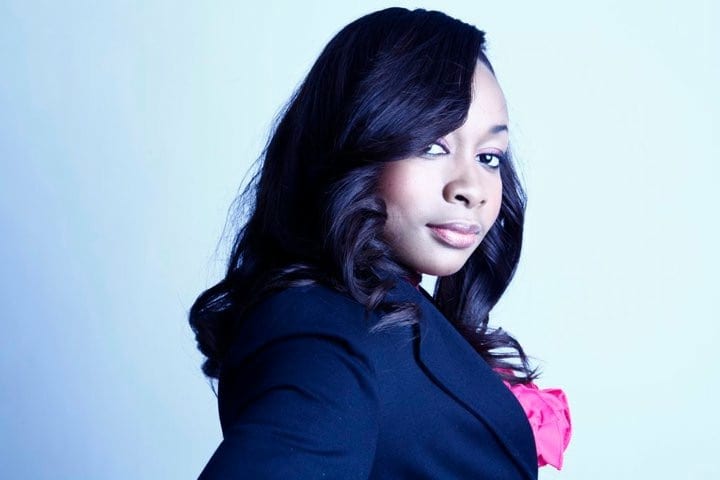
[bctt tweet=”YMF seeks to support & empower less privileged mothers and children in African societies” username=”SheLeadsAfrica”] After working for a while in both the private and public sector, Vivian Sonny-Nsirim decided to follow her passion in supporting and inspiring young girls and women. She founded Young Moms Forum, an online parenting social support networking group for mothers and soon to be mothers. With over 26,000 members the group is aimed at sharing topics, ideas, issues, and challenges surrounding parenting, motherhood, business, relationships, and so on. As a wife and mother of three boys herself, Vivian is a coach and an award-winning inspirational/motivational speaker. How long has Young Moms Forum been in existence and what made you start such forum? Young Moms Forum (YMF) was founded in January 2016 out of my passion to inspire, motivate and educate mothers and soon-to-be mothers on parenting, motherhood, relationships, business, career and other matters of mutual interest. It is a platform whereby women from all works of life come together to share ideas on issues and challenges facing them; provide advice, personal experience and suggestions on how to manage such challenges. The Young Moms Support Foundation (an offshoot of YMF) seeks to support and empower less privileged mothers and children in the society, especially in Africa. How do you manage the forum to ensure unity among members and that the purpose of the forum is maintained? YMF has rules and regulations guiding the members. Any member that goes against the ground rules will be sanctioned. Depending on the severity of the indiscretion, they may be blocked from the group. This means that they will no longer have access to the group’s discussions and articles. With an MBA, one would expect you to grab the next high paid job in the industry. Why choose to be a motivational speaker? I have already done those “high paying” jobs both in Nigeria and the United Kingdom (including stints in the oil and gas industry and appointment in the public sector) but none has given me as much satisfaction as I derive from bringing succor to young mothers and mothers-to-be. Therefore, the driver for my opting to do what I am doing now is the passion in inspiring and motivating young mothers rather than pecuniary benefits. [bctt tweet=”Vivian Sonny-Nsirim has worked high paying jobs but opted for inspiring young mothers” username=”SheLeadsAfrica”] You have stayed in both UK and Nigeria, how would you compare the way women support each other in the different societies? Women all over the world are the same and experience similar challenges. However, the difference lies in the level of education and literacy obtainable in each clime. The level of literacy among women in the UK is alleged to be higher than that of Nigeria reducing such bottlenecks as superstition, myths, unwholesome traditional practices, discrimination and the rest. This makes it easier for women to trust and support one another easier than they do in Nigeria. What are some of the mantras you live by? I believe that, if you try and fail, try again, if you want to change the world, empower a girl-child and, with God all things are possible. [bctt tweet=”Vivian Sonny-Nsirim: If you want to change the world, empower a girl-child ” username=”SheLeadsAfrica”] What is your take on being a stay-at-home mum versus a working mum? Which do you think is the better option? It depends on each woman’s peculiar circumstances and agreement with her partner. The underpinning focus should be on her family’s harmony. In your opinion, what are the four major keys to a long lasting marriage? My four keys to a long lasting marraige will be; effective communication, faithfulness, respect and forgiveness. Tell us two things on your bucket list. We want to build Young Moms Academy in at least 5 African countries where we can empower young mothers through skills acquisition. Secondly, we plan to embark on an enlightenment program to refresh young moms’ knowledge on how to run their homes better. We intend to accomplish these, especially the former, between the next two to five years. If you’d like to share your story with She Leads Africa, let us know more about you and your story here.
Fungai Nembaware: I am not your average fashion designer, I am a cultural ambassador
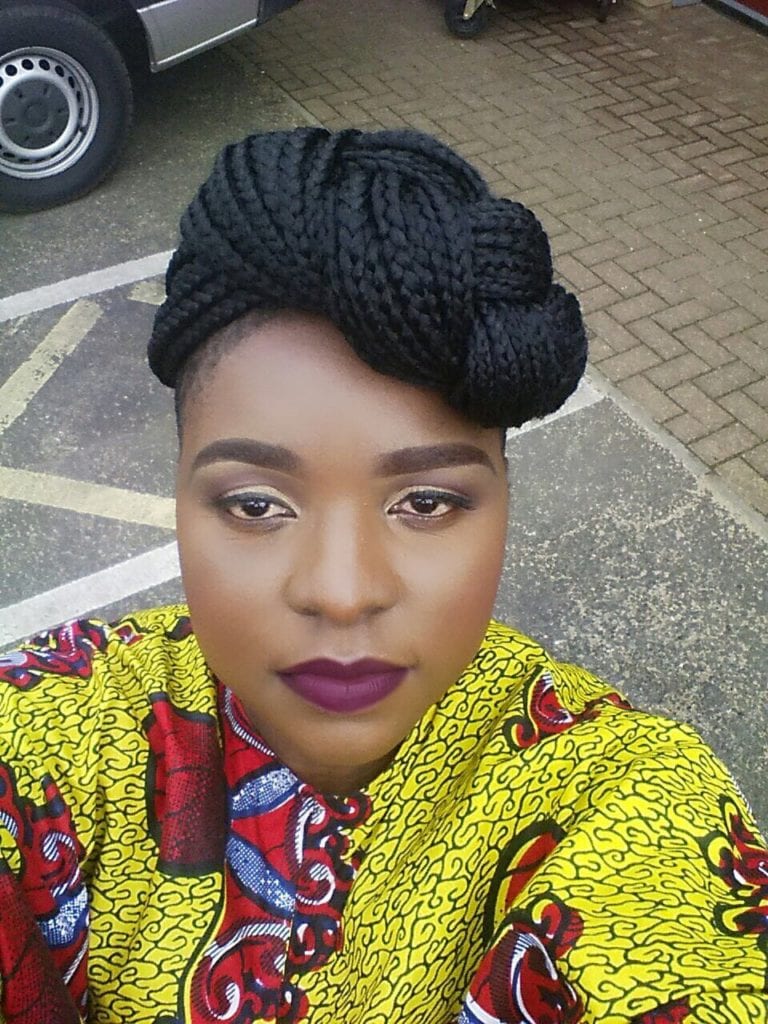
[bctt tweet=”Drawing on ancient Africa, Fungai Nembaware creates accessories from African fabric” username=”SheLeadsAfrica”] Fungai Nembaware, a mother of two boys, a five and eight-year-old started Zuwa Re in 2008. It started as a hobby and building it into a company was something that was just playing in the background. When her son was six months old she decided to go for it, and make shoes, earrings, jewelry, from African fabric. She terms herself a cultural ambassador. Zuwa Re officially started in 2008. Fungai had no formal training but believes what she does is is part of her gift. “African fabric celebrates who we are, and Africa is bright and full of life”, Fungai says. She was looking at re-living and preserving our culture and history. Read on to discover how Fungai Nembaware is teaching people about this history through her art. Where does your name come from? And what does your logo signify? Most of my influences are from ancient Africa. The name is both Shona and Egyptian, Zuwa which means “sun” in Shona a Zimbabwean dialect, and Re which means “sun” in Egyptian. So it basically means Sun of God because I believe every gift comes from a higher source. My logo is a scarab beetle, from ancient Egypt made from the shabaka stone. You can see the sun’s rays from the back shining. What distinguishes your business offering from the competition? I am not your average fashion designer, I am a cultural ambassador. My work comes from well thought out research and isn’t the same as the work out there. For example, when I started the totem earrings, people were skeptical about them and they thought they were anti-religion. Being in the Diaspora, the totem earrings were a way of bringing people together because the family nucleus is diluted. It was to re-emphasize the importance of our culture through oral and creative tradition and educating people of our culture and the importance of togetherness. The totem earrings will help in identifying another sister in a foreign land. It is hard to keep our culture alive because there is so much diffusion. Putting this across in wearable art was very personal. It involved the reawakening of people to a certain level of consciousness and understanding of our histories and culture. This was also a way for me to contribute to the writing of the story of our ancestors as this identifies us as a people. I would like to restore and reclaim our position as African people. [bctt tweet=”I would like to restore and reclaim our position as African people – Fungai Nembaware” username=”SheLeadsAfrica”] How would you describe your business model as you are based in the UK, but have a presence in Zimbabwe? My umbilical cord is in Zimbabwe and therefore I try and work with a few tailors in my home country. I believe every woman’s hands are gifted, and with the use of our hands, we will never be found lacking. We should always think of how we can create our own work. What more can government do to support small businesses? The government needs to find more sustainable ways of supporting women in Zimbabwe. They should speak to young girls and identify people that they can teach and or give loans to. There are a lot of people with visions but they lack resources. What business advice would you give your younger self? Firstly, I would say to parents don’t discourage your children if they want to venture in a particular field. When I was younger I wouldn’t dream of saying I want to go to dress making but had I gone there, I would have achieved my dream a lot sooner. To younger me, I would say do not be ashamed of following your passion, go in and go hard. Be resilient and focused and know that every time you send a positive vibe or word into the universe, a positive vibe will come back to you. Find a tribe of like-minded people, who can encourage you. Know yourself, your strengths and weaknesses but improve your strengths. When you get into business, you should know what you want, and believe in yourself 100%. Pursue good business practices, research, have a mentor, get inspiration from people who have done it before, and find out what made them different, what made them survive? You shouldn’t just wake up and want to do a business without a plan. You should remember that we are all unique, even if there are a 100 people making the same thing that you are making. Improve your skill every time. Don’t limit yourself. [bctt tweet=”Fungai Nembaware – You shouldn’t just wake up and want to do a business without a plan” username=”SheLeadsAfrica”] How do you achieve a work home balance? I am a mother of two boys, studying and running a business. I won’t say that is easy but I will say that I am a strong person mentally. Then I have a great support system, which is really important, we pray and encourage each other. I have a lady who helps me with school runs and the children when I am overwhelmed with work. How do you market your business? I haven’t done a lot of marketing, it has mainly been through word of mouth and via my facebook page. However, I do plan on going bigger this year, 2017. I want more and more people to understand what my work is all about and be able to relate to it. Where can people in Africa buy your creations? Online. I have quite a number of loyal customers in Zimbabwe and I have been shipping to the US and Canada and recently Dubai. There was and still is a huge gap in shipping. What should we look forward to in the next 5 years? In one word, it will be diversification. I plan to do a lot more charity work and incorporate this into my art. If you’d like
Carol Bangura: Operating a non-profit organisation and empowering girls
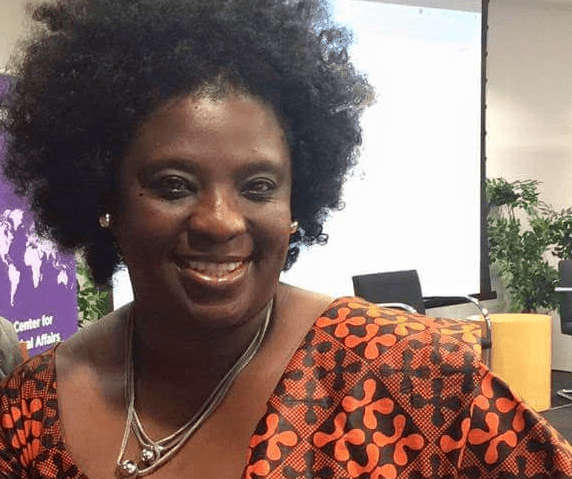
[bctt tweet=”Top skills you need to run a non-profit org from Carol Bangura, award-winning advocate” username=”SheLeadsAfrica”] Carol Bangura is an educator, advocate, philanthropist, and a published author. Carol’s professional experience includes creating culturally and linguistically appropriate education and social integration programs in the Greater Philadelphia. She’s done this for diverse immigrant and refugee women and children from countries including, but not limited to Sierra Leone (her country of birth), Liberia, Haiti, Ghana, Turkey, China, Jamaica, Mexico, and Iraq. Carol has created education initiatives for girls exposed to school related gender-based violence (SRGBV) in Sierra Leone. As someone who has worked in the non-profit sector, Carol is open to providing insight to others. Here are key takeaways from Carol Bangura’s experiences in the non-profit sector. Carve out your niche “The key piece of advice is to carve out your niche. As women, we are natural nurturers and want to save the world. My brand centers on empowering girls through education and social initiatives.” Carol Bangura has been able to create a cost-effective method of purchasing new books and shipping them locally within the US and internationally to Sierra Leone. Carol shipped the first set of books internationally to Sierra Leone in 2007 and has cultivated relationships in Sierra Leone and in the Greater Philadelphia area. Although she ended her program formally in other countries and in the United States, she still conducts informal book donations to girls (and boys) locally with partner organizations. #MotherlandMogul Tip: First take some time out to discover how you want to improve lives. What are you good at? What do you enjoy doing? Once you’ve outlined this, think of ways you can join your passion with helping others. The two skill you need to successfully run a non-profit “The skills needed in the beginning are fundraising and the ability to have doors close in your face! Everyone will not believe in your dream, you have to believe it yourself. Starting an organization takes funds. And when you’re ready to implement projects, they must go through the phases of planning, implementation, and evaluation.” In a nutshell, you should answer the questions, What are you going to do? How are you going to do it? After you’ve done it, how would you determine its success? [bctt tweet=”Carol Bangura: Soon after launching your non-profit create a strategic and financial plan.” username=”SheLeadsAfrica”] Registering a non-profit organisation “Documentation varies from state to state; and country to country. Research should be conducted to determine what is needed to register an organization. There isn’t a one size fits all checklist to start a nonprofit because it depends on the type of organization, its location, board structure, etc.” Carol’s organisation is registered in the United States and though she operates in Sierra Leone, she’s not familiar with what’s required there. In the US, every state has its own rules and then every municipality does as well. The federal government requires a 401c determination but that process is very complicated and Carol has done it in the past for others as a consultant. #MotherlandMogul Tip: If you’re based in Nigeria, Ivie Eke shares 3 major points on starting and sustaining an NGO here. What do first after launch “Prior to launching and/or within the first six months to a year, a strategic plan should be created. You will also need to create a funding plan.” The key to doing this was trial and error. For years Carol wrote grants before finally obtaining unrestricted funding to carry out her GIRLS! project. “Grant writing is daunting due to the checks and balances, but it’s not impossible to do on your own.” Carol identified planning, implementing, and evaluating as the most important skills to hone to perfection. Final words from the brilliant Carol Bangura; “Nothing comes easy, especially for us as African women who choose nontraditional roles and have the audacity to step out of the box. The pain of my past as a victim of gender-based violence fuels my passion; without passion in what can be a thankless job, you’re more likely to be burned out.” If you’d like to share your story with She Leads Africa, let us know more about you and your story here.
Jackie Mgido: It’s taken me years and I’m still in the infancy stages of my business
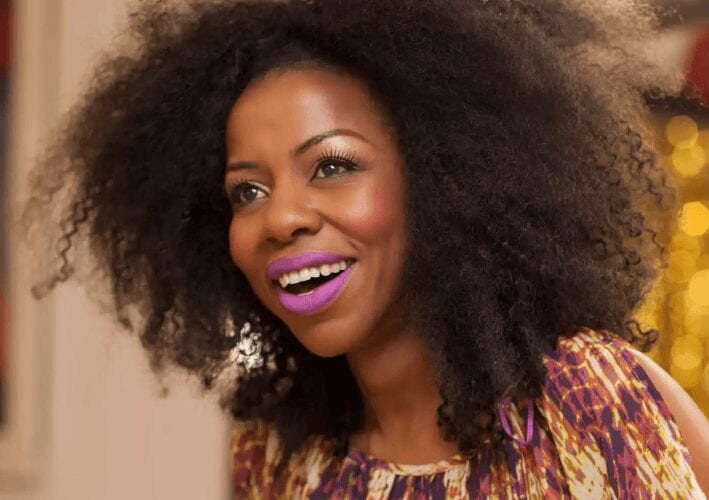
[bctt tweet=”They were thinking, “Who is this Zimbabwean that claims she knows how to do makeup?”” username=”SheLeadsAfrica”] Jackie Mgido left Zimbabwe about 24 years ago; now that’s a long time. Always a dreamer, Jackie wanted to do the unexpected and always wanted to feel fab. In the United States, she looked into what she loves best and found that was everything to with makeup and hair. But, you know that struggle with being African and having passions that are considered outside the norm. First, Jackie did what her parents wanted her to do then after that she decided to go with her passion because it just felt natural. Jackie Mgido is a talented makeup artist and founder of Vault cosmetics. Where did your passions originate? As a little girl I was very insecure, I never thought I was cute. I grew up at a time where there was a division between whites, coloured and blacks. I grew up in a time where women bleached a lot in order for them to be noticed. That’s where it all started; I also wanted to be noticed. I wanted them to say, “Hey, you’re so pretty!” but I realised early that bleaching cream wasn’t going to do that for me. Your passions sprouted from wanting to be noticed as a dark skinned girl just like the light skinned girls were noticed. What are some of the things you would teach your daughter about loving herself? I have a 9 year old daughter. I will continue to speak of kindness to her. You can teach your child confidence all you like and tell them you are who you are but if inside they don’t feel it, it’s a misdirected arrow. When you are kind to other people and people start seeing you for your heart, they really start seeing you for your beauty. Because it will just draw in those people, your popularity goes up; you attract the people that are amazing and your confidence goes up. What would you say are the fundamentals of maintaining a business and keeping it going after you have started? Connecting with your customers! They are the ones that make your business, if you lose that connection with them, then you have completely lost it. Let your customers drive whatever it is that you are selling. Yes, I am the expert but my customers are the ones that buy the stuff, so if I am not giving them what they want and what they like then it’s not going to sell. [bctt tweet=”If you lose connection with your customers, you have completely lost it – Jackie Mgido” username=”SheLeadsAfrica”] The fundamentals are: Understanding your customer Connecting with your customer Letting your customer drive your business Where do you see Vault in 5 years in terms of sustenance of your business? So far Vault has been a trendsetter, we started a revolution. Vault is fostering the mind-set of people trying to start their own businesses, the mind-set of people wearing things that they’ve never tried their whole entire life and most importantly the expansion into other countries and education. Education is key! We are going to be one of those makeup lines that are an education-based and that have hubs all over the world not just in Africa. It’s going to be one of those makeup lines where the customer also feels a sense of ownership because its important for the customer to feel like they are part of something bigger than themselves. Have you felt like changing people perception and the mind-set around makeup has been easy in Africa? I’ll speak on Zimbabwe particularly because it’s my culture, I know the people because I am part of the people. Interesting enough it is harder to show and it’s easier to show and tell. Our philosophy is, teach it, feel it then they’ll buy it. The reason Vault has grown so much in four years is because it’s been a little easier for us to show and tell. So changing the mind-set hasn’t really been that difficult because we are getting people to understand why they are wearing makeup. When, people come in we ask them why they’re wearing makeup. “Are you wearing makeup for you?” That changes everything! Who is the most interesting person you have put makeup on? Charity, she’s a newspaper vendor in Msasa, Harare who stands with a bunch of men at the traffic lights and sells newspapers. Charity had no exposure so she never thought, “If I put on a suit, high heels and glasses, I could sell more”. When we saw Charity and I told my girls we had to Vault her. Now not only does Charity have her glasses, she has her lip-gloss and she can fiercely sell her newspapers. Sometimes, she works for us at big events, handing out pamphlets to attendees. When I’m in Harare, I make time to go and see her. Which man would you love to put makeup on? All the ministers in Zimbabwe
Nigeria’s women’s bobsled team: We are just three regular girls who have now made history
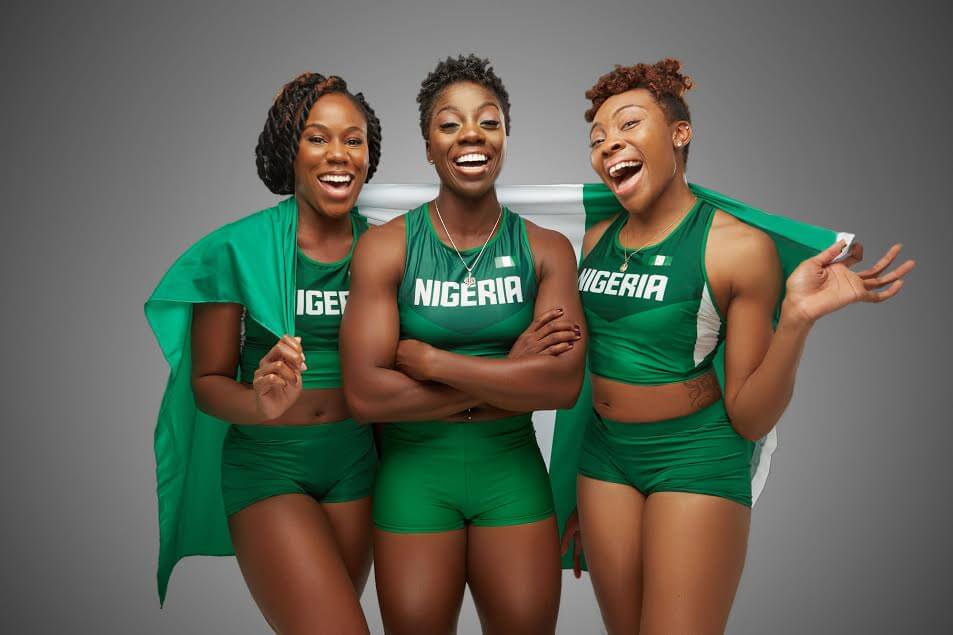
[bctt tweet=”When you are the first person to do something, there is no blueprint ” username=”SheLeadsAfrica”] No African country has represented the sport of bobsled at the Winter Olympics, but that’s about to change thanks to three women aiming to represent Nigeria. Seun Adigun, Ngozi Onwumere and Akuoma Omeoga are shaping history to become Nigeria’s first women’s bobsled team. Seun, Ngozi and Akuoma are established athletes and are engaged in many hustles. Ngozi has background work experience in the mortgage industry and is now a full-time student pursuing a Doctoral degree. Akuoma is the brakeman for the Nigerian Women’s Bobsled Team and also works as a healthcare recruiter. Seun is the driver of the team and also currently a chiropractic student. Seun is studying for a dual degree of a Doctorate of Chiropractic from Texas Chiropractic College and a Masters of Science in Exercise & Health Science University of Houston Clear Lake. Teamwork and support have been integral in giving the women of Nigeria’s bobsled team confidence as they work towards success. Why a bobsled team? How did you decide to come together to do this? Seun: After realizing that my participation as a brakeman on the United States women’s bobsled team had grown to be far larger than me, I knew this was something I had to do. I noticed my ability to potentially empower and positively influence millions of people resided in my decision to give back to the country of Nigeria. I knew I possessed the resources and connections to get it done. The sport of bobsled was looking to grow and the continent of Africa had never been represented in the sport of bobsled. Once I finalized my decision to take on this mission, I knew I would need teammates so I reached out to these lovely women, Ngozi and Akuoma. [bctt tweet=”I noticed my ability to potentially empower & positively influence people – Seun Adigun” username=”SheLeadsAfrica”] Ngozi: Bobsled chose us! Well essentially Seun chose us to be apart of her amazing vision and from then on we made the decision to embark on an experience that would grow beyond us. Seun (who is also my former coach) and I have our annual lunches, at this one particular she brought up bobsled. Honestly, I needed something new and refreshing. I had just made the decision to hang up my spikes and had come off of a trying season competing for Nigeria in track and field attempting the Summer Olympics 2016. So when Seun presented this option to me, I was stoked and pleasantly surprised. Still, this didn’t become reality for me until we actually had our first practice and touched Seun’s wooden self-made sled, “The Mayflower”. Akuoma: Bobsled came out of the blue for me. I was familiar with the sport being that a coach of mine had been involved with the sort. My participation came out of Seun Adigun asking me to join this mission. I accepted and I was the third piece to the puzzle. How has been your experiences as African women in sport? What unique challenges have you encountered? Seun: So far the experience has been very rewarding as we have been receiving endless support and positive energy as we take on this task. The most challenging thing so far has just been navigating the unknown and doing it fearlessly. When you are the first person to do something, there is no blueprint for the optimal plan of action —you just have to trust God and work through the process one step at a time. Ngozi: As a Nigerian-American woman, I have been embraced by my teammates and by other aspiring athletes, Nigerians and just women in general. Challenges will always come when you are embarking on something completely new but we have adapted very well. With With us all being women with very high demand schedules, there have been some challenges in accommodating everything but we do quite well. Also, the learning curve of learning a completely new sport has been challenging but we aim to conquer. Akuoma: My experience has been the same as it has always been. Growing up I had always been active in sports and so have many other Nigerians that I grew up with. So being a Nigerian girl in a sport was pretty normal. I think the biggest challenge with this sport in particular, is that there isn’t a lot of awareness. So taking myself along with everyone else I know on this huge learning curve has been a bit challenging. [bctt tweet=”I had always been active so being a Nigerian girl in a sport was pretty normal – Akuoma Omeoga” username=”SheLeadsAfrica”] So far you’re yet to practice on snow or with a bobsled, how confident are you in securing a place at the Olympics? Seun: I have spent time on ice as both a brakeman and a driver —and that is the most important thing. As the driver, the success of the team resides in my ability to drive the sled from the top of the hill to the bottom. I have already successfully completed two driving schools this season on two separate tracks over the course of three weeks. With that, I can now compete in a race on either of these tracks, putting us in position to start the qualification process. This is a great confidence boost for the team because we now have something to look forward to. Our confidence is additionally fueled by our relationship with one another. We trust each other and that has taken us a long way in accountability and commitment. Our wooden sled has given us the opportunity to simulate sled conditions bringing our chemistry together and reproducing race scenarios. Ngozi: I think there is much to be said about mental preparation as this plays a big part in physical preparation. Although we have not yet been on ice, we have the perfect mentor to take advice from (Seun) as she was in the same
Rajah Saparapa: Sawaree aims to bring people what they need
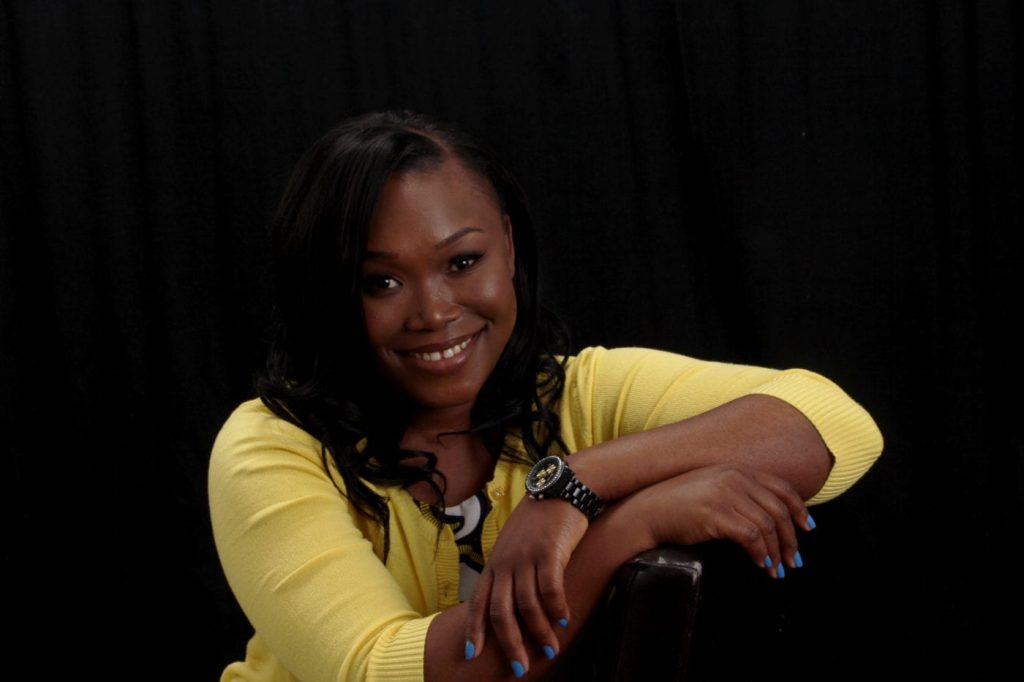
[bctt tweet=”Rajah Saparapa: Togo needed a platform where people can get packages from anywhere” username=”SheLeadsAfrica”] Rajah Saparapa is both a student and the CEO/founder of Sawaree. From Togo, Rajah lives in the US where she saw an opportunity in launching a business that could easily make people in Togo access goods and products from abroad. Rajah has always wanted to be a leader, especially in Africa. She is able to balance her studies and business as Sawaree is an online store, enabling her to work remotely. She was able to launch and run Sawaree using her own money that she saved up enough to invest. Now Rajah’s looking for new investment and opportunities to grow her brand. Take us through the first 6 months after launching Sawaree. The first 6 months were intense. I am going to be honest with you, it is still intense. After Sawaree was launched, we had no sale for a month and half. A friend volunteered some hours to help me with the online advertisement; we tried to maximize our social media ads on Facebook, Instagram and so on. Since it is a new venture in Togo, many people were skeptical about using our website; unless someone they know had given it a good review and could vouch that it is safe and reliable. It is all about trusting Sawaree and trusting us. I literally harassed my family members to talk about Sawaree and to order from Sawaree. I wanted them to share their experience not only with us but also their communities. [bctt tweet=”Sawaree is a new venture in Togo, many people were skeptical about using it – Rajah Saparapa” username=”SheLeadsAfrica”] Our first customer was a family member, then his friend ordered. It was exciting. However, Sawaree is still struggling to get its name out there, and to earn the trust of the Togolese diaspora. We listen to comments that people leave and try to bring them what they want and need. At first, Sawaree did not have a currency exchanger on the website. The prices were posted in US Dollars and some clients from Europe complained that it makes them feel like they were not our target audience so we installed a currency exchanger to facilitate prices our clients. We have also learned that our clients like sales and so we use sales to attract new clients. Feedback is very important to me, it is how I know that what we are doing right and what we can improve. As a CEO, it is very important to be open to criticism and make room for improvement. When I started Sawaree I knew it was not going to be easy. I have learned how to work twice as hard and to manage my frustration by tackling issues head on. Why was it important to have a platform that allows the Togolese diaspora to deliver groceries to their family in Togo? I always heard stories in the Togolese communities here in the USA or in Europe about an individual sending money back home. This was money to be used to buy groceries, but the money ended up being used in another way. This is a problem not only among the Togolese diaspora but others too. When my best friend from Cameroon told me about a platform like Sawaree that was available in her country, I thought to myself that Togo needed something like that. Something to make it easier on its diaspora, something convenient where people will not need to get out of their home and drive to a store to send money. A platform where family members back home in Togo will be receive packages without having to make any effort. Most of the platforms that are available in other countries do not guarantee delivery. The customers have to usually come and pick up their packages in the store but with Sawaree, we do delivery. How do you manage to keep your promise of delivery within 24 hours from anywhere in the world? The idea of having something delivered to your home is a new concept in Togo. After doing my research, I found that there isn’t any other store that does delivery in Togo. That is what makes Sawaree different, we literally come to you. As stated on the website, all orders that are made before 6PM are delivered the next day, within 24 hours. We have a partnership with our providers that we send orders to as soon as we get them; our provides have it ready for us for pick up and we deliver. The delivery process involves a lot of phone calling. In Togo, knowing or having a physical address number and street name is a hassle so Sawaree does it the old fashion way. We call the recipient of the package and ask him to identify to us where he or she lives. It has been a challenge but after we have a client order to the same home twice, it is much easier for the delivery man to know where he is going. I am proud myself in knowing that Sawaree has never missed its delivery window. [bctt tweet=”Rajah Saparapa: Sawaree promises global delivery within 24 hours and it has never missed” username=”SheLeadsAfrica”] Is there a story behind the name “Sawaree”? I was figuring out name for the company with my mother and my sister and it took days. Any name I came up with was already taken, then I thought, why name it in French or English? I decided to name it in Tchokossi which is a dialect in the North of Togo, where I come from. I speak Tchokossi and it is part of me, so I thought it was good to go back to the root. Then Sawaree came to me, it means “patience”. I knew that the journey for building and establishing Sawaree was not going to be an easy road. I wanted to remind myself that any time I read up Sawaree,
Rose Njeri: My clients become family once they start training with me

[bctt tweet=”Fitness helped Rose Njeri gain confidence & she knew she had to share this with others” username=”SheLeadsAfrica”] Rose Njeri runs things at RoseFit, LLC. She’s always played sports and credits her love for exercising to her passion for being a personal trainer. Though she is a certified personal trainer, Rose does not limit herself to one project; she is also a face of Kenya ambassador, model and actress. In addition to that, she is currently pursuing a Masters degree in Marriage and Family Therapy. Fitness is something that has helped Rose gain more confidence. Seeing what positive impact fitness has on her life, she knew she had to share it with others. Read on to find out how Rose Njeri is motivating others to live a happy, healthy and positive life. When did you realize it was your passion to help people live a healthy life? I enjoyed helping people around me get into fitness and shortly came to realize that I could help more people. I also saw a need of teaching people live a healthy life. Considering the abundance of businesses and services in the health industry, what makes your brand stand out? What makes my brand stand out is the relationship I build with my clients. They become family once they start training with me. I become their biggest fan! I want them to win. All they have to give me is a 100% and I will help them accomplish their fitness goals. I do my best to teach my clients to see working out as a lifestyle and not as torture. I always wish to leave a positive impact in their lives. [bctt tweet=”I see a lot of opportunities in the health and fitness industry – Rose Njeri” username=”SheLeadsAfrica”] How did you come up with the RoseFit brand? RoseFit came from my amazing friends and family. They would call me “Rose, the fitness guru” and from that I came up with RoseFit. Also, having my name on the brand makes me work harder because I want it to mean more and stand for something bigger. What do you think of the health and fitness industry as it now? The health and fitness industry is growing! More people now understand the value of it. I believe there is a need for it! I’m constantly learning new ways to make it easier for people to learn more about health and fitness. There are variety of opportunities beside training in health and fitness industry. I’ve gotten to be a motivational speaker, sell fitness gears, host 5K Runs and be a mentor, all in the health industry. I see a lot of opportunities but it all requires hard work and commitment. You offer diverse services including gear, how do you manage them all on your own? It goes back to working for my brand; I’m willing to do whatever it takes for RoseFit to grow. I am learning to balance it all out but it takes time. Can you tell us about being an award winning fitness coach? It was a surprise for me when I won an award. When I started out as a trainer I did free boot-camps in my community. They brought a lot of people together and were a great way for me to network. I saw that fitness brought people together and so I wanted to create more opportunities for the community to stay active. Also, I participated in Face of Kenya USA pageant and one of the tasks we had to do was to raise money for a charity of our choice. I came up with the idea of having 5K runs to raise money and it turned out to be very successful. The community got to know me as a trainer and they would turn to me for any help concerning health. I was invited to a community event as Face of Kenya ambassador and there, I was awarded a fitness award for influencing people in the community to workout. It was a blessing because it was women-focused event named “Queens Night” and I love events that aim to empower women. [bctt tweet=”Rose Njeri: When I started out as a trainer I did free boot-camps in my community” username=”SheLeadsAfrica”] You’re a woman of diverse talents as a model and actress too, how do you balance it all? Honestly I am still learning how to balance it all but I take any opportunity that I’m given and give it a 100%. I am truly blessed and that is the best way to describe it. How do you keep the passion alive in everything that you do? I pray for everything I do and trust God’s ways for my life. When God is involved anything is possible. Also, I enjoy it all and make sure I’m having fun. When you’re doing something you love, you enjoy it! If you’d like to share your story with She Leads Africa, let us know more about you and your story here.
Gbemisola Isimi: Our mission is to preserve and promote African languages
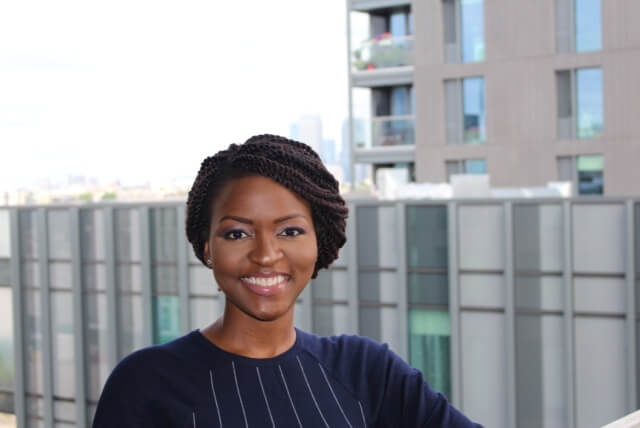
[bctt tweet=”Gbemisola Isimi hopes to make learning African languages a fun & interactive experience. ” username=”SheLeadsAfrica”] Gbemisola Isimi is the CEO & Founder of CultureTree and she wants children to learn African languages. We can’t ignore the importance of speaking your mother tongue(s) but in a globalised world, many children are losing touch with their languages. CultureTree provides a solution to this problem. At present, CultureTree teaches children the Yoruba language through popular nursery rhymes, folk songs, stories, games and other educational resources. They plan to expand and introduce other African languages in the near future. What would you say is the innovative idea behind CultureTree? The idea for CultureTree was birthed when I had my first daughter who is now 3 years old. I wanted to teach her Yoruba but I couldn’t find anything online. I noticed she loved watching nursery rhymes on Youtube and could sit for hours watching it, even the ones in foreign languages. So I searched for Yoruba nursery rhymes but there was only one at that time and it wasn’t an animated cartoon but someone singing. That was when I thought of creating them myself. Kids love our nursery rhymes because they are already familiar with most of the songs. Baba MacDonald for example is particularly popular because kids love the Old MacDonald had a farm nursery rhyme. They are simply learning the Yoruba version of it. We hope to make learning African languages a fun, interactive and natural experience. Children are more likely to be curious when presented with songs, rhymes, stories and games and therefore are more likely to learn and retain knowledge. [bctt tweet=”I searched for Yoruba nursery rhymes but there was only one at that time – Gbemisola Isimi ” username=”SheLeadsAfrica”] Can you tell us more about your business as a social venture? As Africans, our language is a very important part of our identity. Yet I noticed that a lot of us (Nigerians especially) living outside of Africa no longer speak to our children in our mother tongue. Even those of us who do speak our language to our children don’t get a response from them in our language but rather in English. This is because English is what we are surrounded with and unless parents have the tools and resources to help with teaching our languages, it will be a continued struggle (especially for those in inter-marriages, non-speakers etc.) Our mission is to preserve and promote African languages and also reignite the love and passion for our languages. As I mentioned earlier, we hope to provide as much educational resources as possible to teach children African languages. We believe it is very important to catch them young because children are so intelligent and can learn multiple languages very easily. As parents it is our duty to educate our children on our culture and language. If we don’t pass our language on to the next generation it will surely die. What four skills have you found yourself using/learning frequently since starting Culture Tree? There are so many but the four that stand out for me are: Discipline I’ve had to be very disciplined with my time, money, efforts, everything! Usually when working 9-5, you really don’t think about this because everything is so much more scheduled. As an employee you start work at 9, have your lunch around maybe 1pm then finish at 5/6-ish. When I first started working for myself, I used to think, “Yes I’m my own boss now, I can do whatever I want, even sleep till 10am”. I’d start working around 1pm but before I could even type one full sentence, the day would be gone and I’d have achieved nothing! Same with money, I can’t walk into Reiss and buy that expensive top any more without thinking about my bank balance because there’s no regular salary at the end of the month (at least till I hit the big-time). To cut a long story short, I’ve had to apply self-control in everything and work out a routine that allows me to be productive. [bctt tweet=”Gbemisola Isimi: I’ve had to apply self-control in everything and be productive.” username=”SheLeadsAfrica”] Time-management and planning skills This follows on from being disciplined. You know that saying, ‘time flies when you’re having fun’? Well, I’ve learnt that time also flies when you’re not planning your time! I’ve learnt to prioritise my time and also plan ahead. I now set time aside each week to plan for the entire week and also make daily adjustments. I know when my peak energy times are so I work during those times and also keep a to-do-list. Communication I can get in about 20 words in one sentence because I talk very fast! And yes that is a skill! But that is not the kind of communication skill that has come in handy strangely. We are surrounded by noise everywhere, in person, online, on TV, etc. People can easily switch off if the information you’re giving them is too much or too long. I’ve had to work on being able to express the idea of CultureTree in a clear and concise manner. It is very important to learn to pick out the most important concepts of ones’ ideas and speak about them with clarity. I am also very enthusiastic about the business and I think this shows when I talk about it. If you are not enthusiastic about your idea, it is hard to persuade others to believe it is good one. Learning skills: Learning is a skill and one should never stop learning! I’ve always been a quick learner but there are so many technical skills I lack that I want to learn. It is very important to be willing to learn new skills constantly. For example, I’m learning how to create children’s games. I can easily hire someone to do this but it’s also useful for me to know how to do it myself, not to mention the fact that it’ll
Oladoyin Oladapo: I never planned on writing a book series
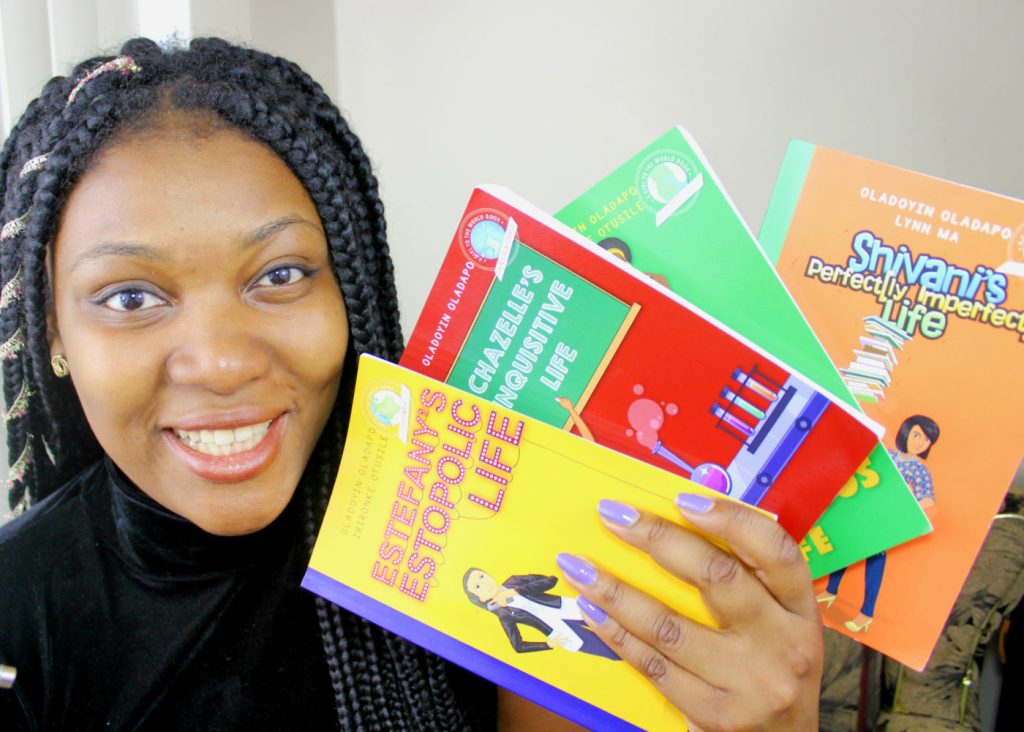
[bctt tweet=”Oladoyin Oladapo is inspiring girls to reach their maximum awesomeness with Girl to the World” username=”SheLeadsAfrica”] Oladoyin Oladapo is the author of the “Girl to the World” book series which consist of four chapter books and four picture books for children below 12. These books share values essential to girlhood; intelligence, curiosity and self-esteem while highlighting the diverse world around us. They are more than learning about differences instead, they are fun and captivating to read like traditional children’s stories. This is because after spending six months in a local elementary school with her team, Oladoyin discovered that children that age are not as concerned as we were about learning about developmental concepts such as culture and values. So if her team wanted to get children to read, they had to mask all the educative material with fun and exciting stories. This led them to create the “Girl to the World” book series which empower children but are still fun to read. The series teaches children but not are not textbooks. Oladoyin believes that the content children consume at this age moulds their future; her goal is to expose children especially girls to different cultures. Read on to find out how Oladoyin Oladapo is helping girls reach their maximum awesomeness through the celebration of culture, girl power and universal concepts like arts, friends, family, fashion, sports and school. Tell us a little about yourself and your writing background? I am from Nigeria but live in the USA. My family migrated to the States when I was very young, so that was where I had most of my education. I studied sociology with education concentration and political science with international relations concentration. Around my junior year, when I first got the “Girl to the World” idea, I was studying gender and inequality in education and I think that a lot of that really formed the idea. I however planned on making multiple things with the idea; thus toys and animation etc. The first prototype I made with this idea wasn’t a book. I had to try out other things until I finally decided to start with a book, which was a great idea I must say. With regards to my writing background, I never had professional experience in writing. But I was always doing creative writing among others in school which gave me some experience in this field. So when the time came to write the books, what I did was to put together what I knew and I guess I did the best that I could. You said you and your sister read a lot when you were young, which books had the most impact on your life? Would you say reading so much at a young age ignited this passion to write the Girl to the World series? My sister and I read a lot, I remember reading the Bible a lot when I was growing up. At that young age however, I wasn’t able to understand the Bible so I was given the picture Bible which made it a lot easier to understand. In terms of actual storybooks, our dad would take us to the library all the time. We spent an entire summer reading Chicken Soup for the Soul. I mean we read the entire series of that book just like the Babysitters Club, the Magic Treehouse, Junie B. Jones and Captain Underpants series. I really enjoyed Captain Underpants because it was an easy read and I loved the pictures and how funny it was. Also I believe that because I read so much, I had the confidence that I could write the book even though it was something I never planned on doing. [bctt tweet=”Everyone wants to know why I don’t have a Nigerian girl in my series – Oladoyin Oladapo ” username=”SheLeadsAfrica”] From your Youtube video, you stated that there are four chapter books and four picture books about four amazing girls. These girls are Akua from Ghana, Shivani from India, Estefany from Colombia and Chazelle from Trinidad and Tobago. How did you come up with these characters and how did you choose their nationalities? Was is random or planned? Everyone wants to know why I don’t have a Nigerian girl. It’s a long story. The thing is, the first person who joined my team was a Ghanaian girl who helped me write the first story. And later, when we decided to extend to other characters, we wanted geographical diversity. It didn’t make sense to have Nigeria which is like two doors from Ghana. I wanted to get other places around the world. Ghana was already there so I decided to hold on with Africa and try other continents. Then I decided to choose countries that I felt like I knew enough to write about. As I am an outsider and not from any of these cultures so I did research and talked to people who are from there. I wanted to make sure I had enough resources, facts and details so I could write about them. I wanted it to be authentic, genuine and good. That was the major reason for creating stories from different regions. Also these were cultures I really really enjoyed. I feel like if I wasn’t a Nigerian, I will be Indian. All these countries I was exposed to, I felt like part of them. With each character we wrote about, I felt like I was the one in the story. As a Nigerian, I have lots of Ghanaian friends and I am used to their culture so I chose cultures that resonated with me. However, these characters are just the beginning. I plan to extend to all the other cultures. You and your team spent six months in a local elementary school to study and test out your contents. Can you share with us some of your findings? What I learnt was that children just want to have fun and want to be engaged first and foremost.
